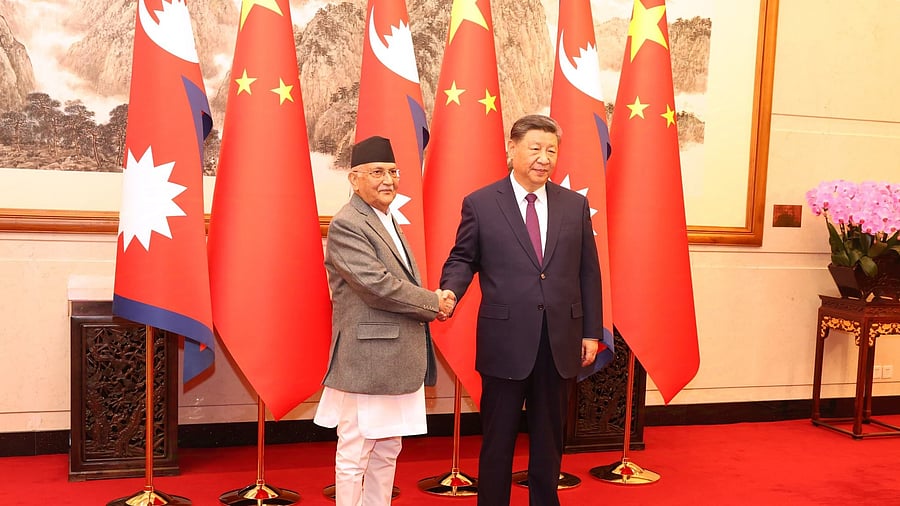
The agreement was inked during Prime Minister K P Sharma Oli's official visit to China.
Credit: X/@kpsharmaoli
New Delhi: As President Xi Jinping hosted Prime Minister K P Sharma Oli, Beijing and Kathmandu clinched a deal on Wednesday for the implementation of China’s Belt and Road Initiative (BRI) in Nepal.
Though Kathmandu had signed a Memorandum of Understanding with Beijing for cooperation under the BRI soon after China had launched the ambitious cross-continental connectivity initiative in 2017, the negotiation on the deal for its implementation in Nepal remained stalled for several years. New Delhi has been opposing the BRI and conveying to Kathmandu its expectation that Nepal would be mindful of the sensitivities of India.
“Nepal-China economic cooperation will further strengthen under the Belt and Road Framework Cooperation,” said Oli, who had during his last term as the prime minister ratcheted up his country’s territorial dispute with India over the Lipulekh-Kalapani-Limpiyadhura area – at a time when the Indian Army had been resisting the Chinese People’s Liberation Army’s aggressive moves in eastern Ladakh.
Oli toppled Pushpa Kamal Dahal’s government earlier this year to return to the office of the prime minister in Kathmandu on July 15.
Xi on Tuesday assured Oli of China’s continued support to Nepal in safeguarding its national independence, sovereignty, and territorial integrity as well as in transforming itself from a “land-locked country” to a “land-linked country”.
The BRI has triggered controversy around the world as China’s predatory lending practices put several developing nations in Asia and Africa in debt-traps.
China not only got Nepal to shed its inhibitions about the BRI and to sign the deal for its implementation, but it also of late stepped up its efforts to expand its political influence in Bangladesh, where the collapse of Prime Minister Sheikh Hasina’s government on August 5 put India in a tight spot.
The Communist Party of China recently played host to a 10-member delegation of Jamat-i-Islami and other radical Islamist political parties of Bangladesh – all known to be opposed to India.
With India expressing concerns over atrocities on Hindus and other minorities in Bangladesh after the collapse of the Awami League government, New Delhi’s relations with the interim government led by economist Muhammad Yunus in Dhaka were strained over the past few weeks. The recent arrest of Hindu monk Chinmoy Krishna Das Brahmachari at Chittagong in Bangladesh triggered protests in India.
Beijing, however, conveyed to the interim government in Dhaka that China’s commitment to develop its relations with Bangladesh remained unchanged notwithstanding the change of regime in the South Asian nation.
Yunus recently had a meeting with Yao Wen, Beijing’s envoy to Dhaka, who told the chief advisor of the interim government that China strictly followed the principle of non-interference in the internal affairs of other countries.
China’s iron brother Pakistan too stepped up its outreach in Bangladesh, notwithstanding the bitter and bloody history of the two nations. Syed Ahmed Maroof, the envoy of Islamabad to Dhaka, had a meeting with Begum Khaleda Zia, a former prime minister and the leader of the Bangladesh National Party.
New Delhi, on the other hand, will host Bhutanese King Jigme Khesar Namgyel Wangchuck, in New Delhi on Thursday and Friday, amid renewed attempts by Beijing to press Thimphu to accept its terms for settlement of the boundary dispute. Prime Minister Narendra Modi will also play host to new Sri Lankan President Anura Kumar Dissanayake in New Delhi this month.
